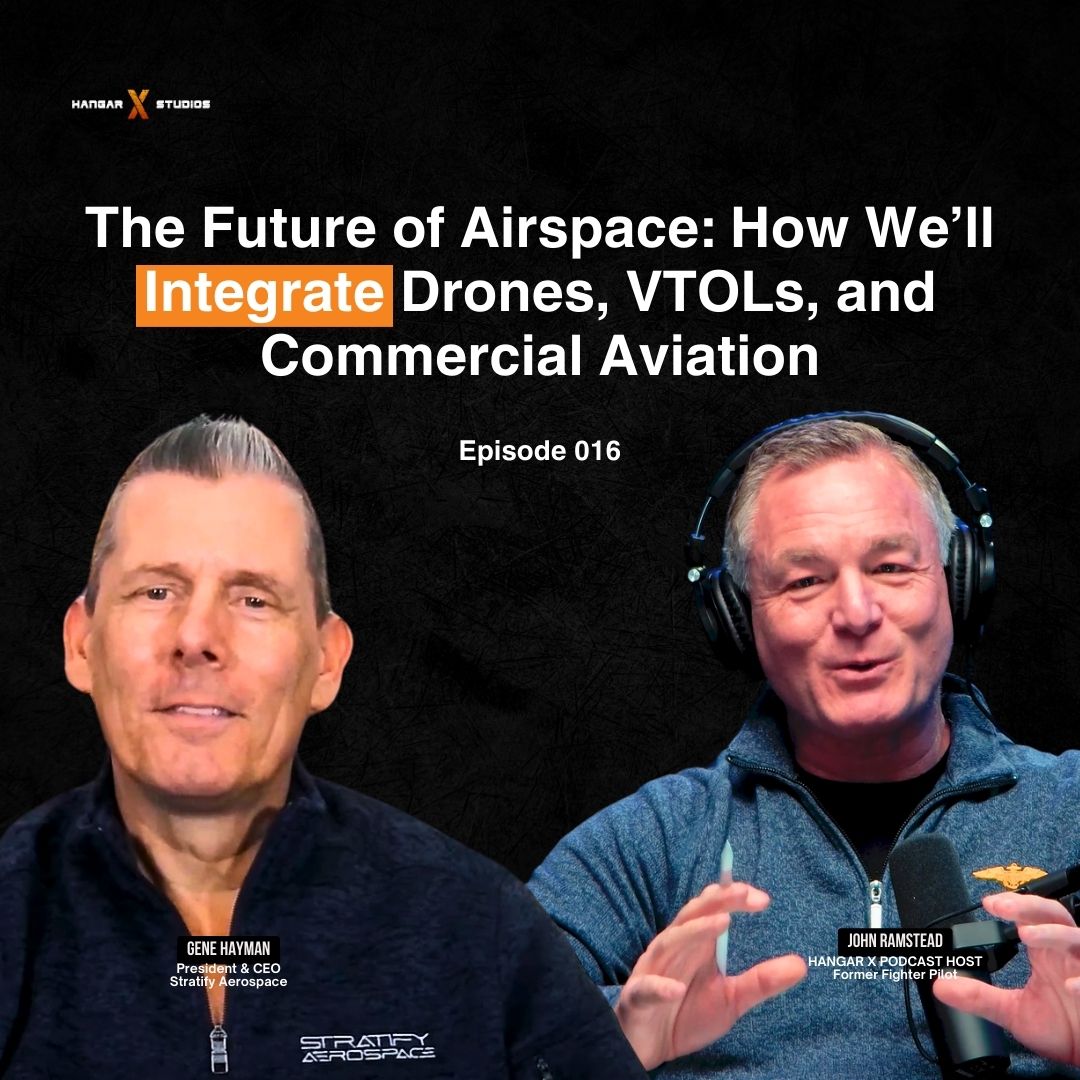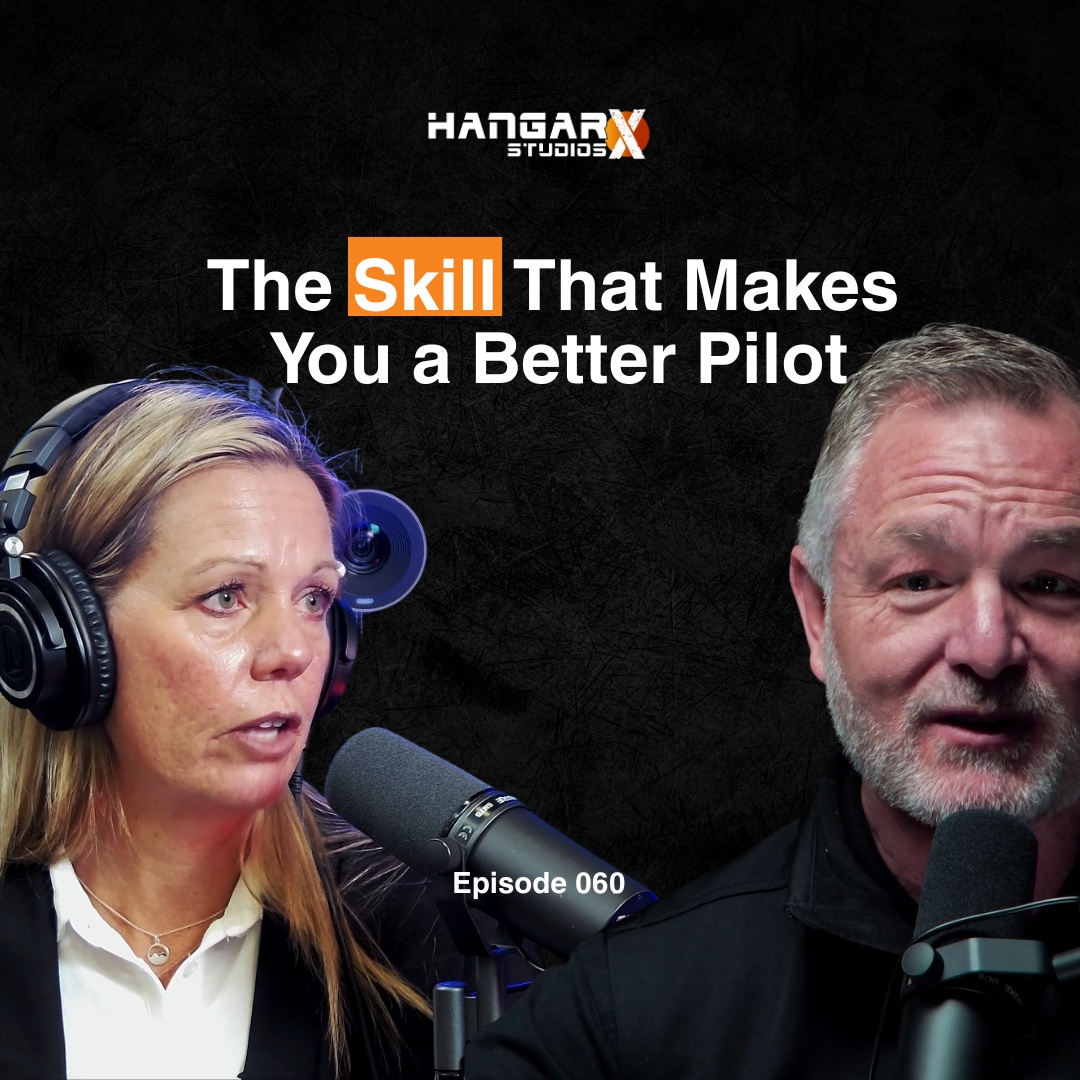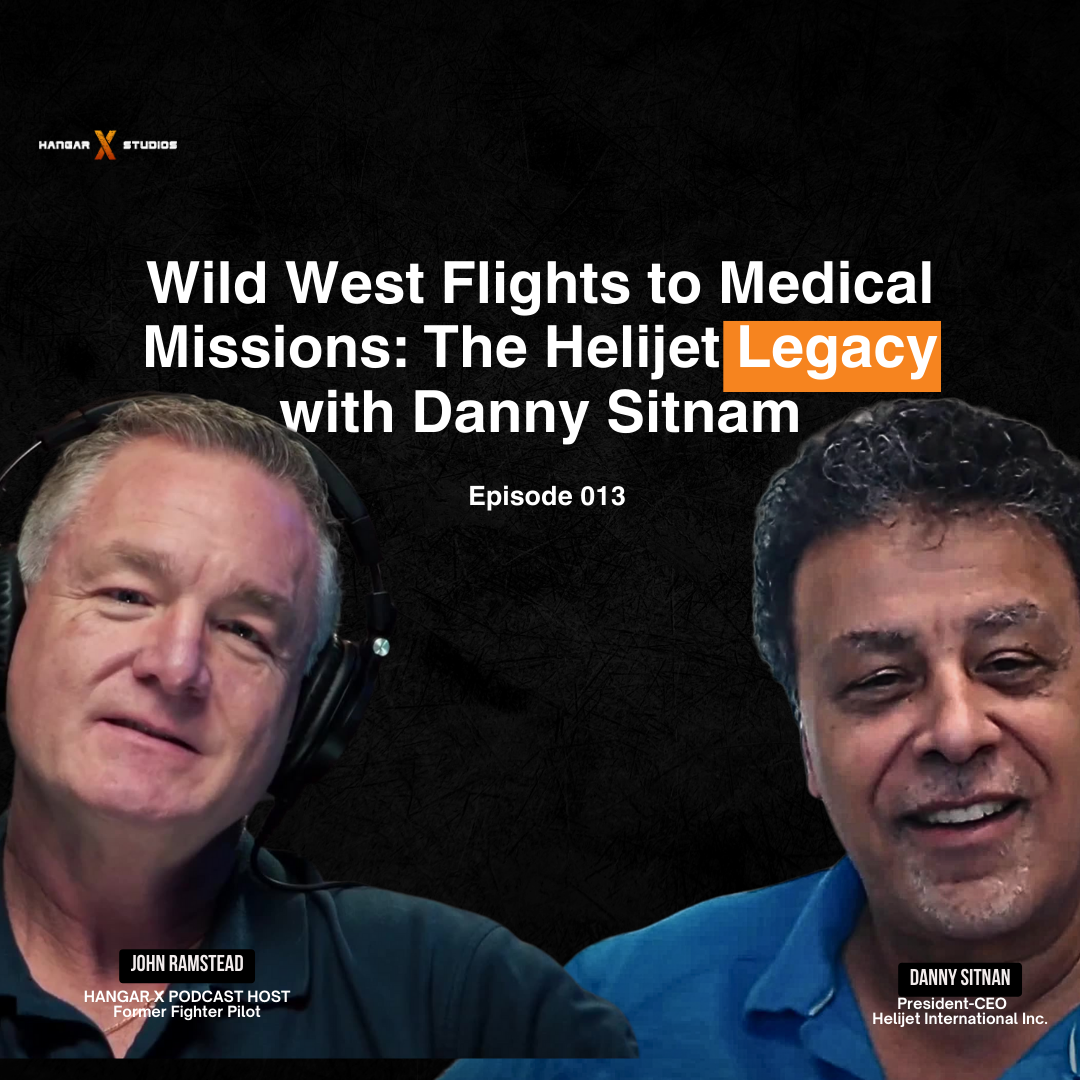Episode Transcript
[00:00:02] Vincent Mickens: The easiest way to kind of explain safety management or SMS is that it is. It's procedural, so it's. It's actually laying out procedures in an effective way again to. To make operations safer and also to make it easier, to make it a seamless type of environment for pilots to just be able to manage what they do.
[00:00:27] Intro: Welcome to Hangar X Studios, where former fighter pilot and host John Ramstead takes us on a journey across aerospace as it enters an historic period of innovation and transformation.
Our guests include aviation experts, pilots, financiers, military leaders, and innovators of all types.
Buckle up for another episode of Hangar X.
[00:00:57] Vincent Mickens: All right.
[00:00:57] John Ramstead: Hey, welcome to the Hangar X podcast. We're at. We're here live at Verticon, and this is where innovators and disruptors and the doers in airspace are coming. So we get to learn about what's really happening first so we can be ahead of the curve and everything. And we have Vincent Mickens on today from Private Air Media. Vincent, welcome to the podcast.
[00:01:17] Vincent Mickens: Yeah, thank you. It's great to be here.
[00:01:18] John Ramstead: Yeah. And we got introduced through Bailee Wood, who is the communications director here for all of verticon.
[00:01:25] Vincent Mickens: Absolutely.
[00:01:26] John Ramstead: And so tell us a little bit about Private Air Media first.
[00:01:28] Vincent Mickens: Sure. So it's Private Air Media Group, actually, but I started it as a consulting firm a few years ago after working for.
For advocating for aviation.
First was first with MBAA and before that with aopa.
I started the firm because I felt like there was a need for somebody that had expertise in media and public relations specific to aviation. So there are a lot of firms out there that do media, public relations and related type of things. But in terms of knowing the industry, I've been in the industry a long time and know every aspect of it, both on the general aviation side, the commercial side, the fixed wing side, the rotary wing side, etc. So it just makes sense for me to. To do something like that. So. So basically putting together media campaigns, public relation campaigns, or anything related to that is what I do for a number of companies.
[00:02:26] John Ramstead: I love that. Now, what got you into aviation? Because it sounds like you're hitting. You're hitting on all. All aviation cylinders. The only one I didn't hear is military.
[00:02:33] Vincent Mickens: Yeah, well, actually, I wanted to be a naval aviator.
[00:02:36] John Ramstead: Okay. I was.
[00:02:38] Vincent Mickens: Which you were. And. But my glasses didn't allow for that. So. So my next option, I ended up doing, you know, I call it an oxymoron Navy intelligence.
[00:02:47] John Ramstead: Okay.
[00:02:48] Vincent Mickens: So. But I. I had the option of being a navigator or, you know, Backseater. But I, you know, if I couldn't have my hand on the stick, I was like, I didn't want to do that.
[00:02:58] John Ramstead: I would have made the same choices.
[00:02:59] Vincent Mickens: So I did the civilian route. I started actually learning to fly in high school.
I got inspired by seeing a 16 year old landed aircraft 172, a four seater at Lambert St. Louis International Airport. And I was like, well, if he can do it and he doesn't even have a driver's license, I know I can. I can do 12 at the time.
[00:03:17] John Ramstead: Okay, so.
[00:03:18] Vincent Mickens: But aviation has always been part of my life.
And I had a broadcasting career for 17, 27 years. 17 years. 27 years. And aviation was always a part of that.
[00:03:31] John Ramstead: Well, you got a great voice. We'll have to bring you on as a guest host for some of our panels. Vincent.
[00:03:35] Vincent Mickens: I'd love to do that.
[00:03:36] John Ramstead: Okay. That'd be kind of fun.
[00:03:37] Vincent Mickens: It'd be kind of fun. So to make a long story short, I kind of stumbled into aviation advocacy about 20 years ago, first working for AOPA and then most more recently for NBAA.
And that, what was it, when you.
[00:03:52] John Ramstead: Say advocacy, what was the, the place that you were passionate about in that?
[00:03:56] Vincent Mickens: Safety.
[00:03:57] John Ramstead: Safety. Okay.
[00:03:58] Vincent Mickens: Yeah. So I was with the air safety at the time, it's called the Air Safety foundation as part of aopa.
And, and then it became the Air Safety Institute, which it is now. But it was all about safety. And that's just something as a pilot that I've always been passionate about.
And then the fact that there's organizations like AOPA and NBAA and others that really push for everything that can be done to make flying safer.
And on all aspects, whether it has to do with regulatory, international ops, domestic ops, et cetera, that just really stuck with me. And so I, I pursued it.
[00:04:37] John Ramstead: So now, you know what, we've had a lot of high profile incidents already this year.
[00:04:42] Vincent Mickens: Absolutely.
[00:04:42] John Ramstead: Coming into here. And, and you know, there's a lot of tools that are coming out. You know, predictive maintenance, autonomous flight control systems. There's things that I'm really hoping that help make the airspace and flying safer. But what are you seeing some of the trends that are going to, you know, maybe allow us to have some of the, you know, fewer headlines than we've seen.
[00:05:05] Vincent Mickens: You know, I think one of the big ones, and I'm going to admit I'm a little biased on this one, it's safety management systems, sms.
[00:05:11] John Ramstead: Okay.
[00:05:12] Vincent Mickens: There are companies like A Nimble and others that are doing really sophisticated and detailed work regarding safety management. But the main thing that they're doing is they're making it easier for flight ops and for pilots to, you know, handle that and mitigate that and things like that. So I think safety management is one of the bigger things that's, that's moving forward right now and it's, it's spreading into all aspects of flying.
[00:05:40] John Ramstead: Yeah. So what is a. For people that maybe aren't familiar with was an SMS maybe compared to what. What people are familiar with today? Like, what's the compare contrast between the two?
[00:05:51] Vincent Mickens: Well, so the easiest way to kind of explain safety management or SMS is that it is, it's procedural, so it's, it's actually laying out procedures in an effective way, again, to make operations safer and also to make it easier, to make it a seamless type of environment for pilots to just be able to manage what they do.
And I think.
Hoping that answers your question.
[00:06:20] John Ramstead: No, it does, because. Well, I was in the Navy as a fighter pilot in a squadron.
[00:06:24] Vincent Mickens: That's why I was a little nervous about it. I was like, I'm talking to ex fighter pilots.
[00:06:27] John Ramstead: Well, you know, it's different, though, because you have a culture of a squadron and we're all working together and we all communicate and we have, we all have to operate a level of excellence. So even if you and I aren't best friends, I'm still putting my life in your hands and vice versa. So there's.
And as a safety officer there, you already had this culture, but everything was integrated. We're all together all the time now. It's different in a lot of flight operations, flight schools, where you might not even know a lot of the people.
It's more dispersed. Does that make sense?
[00:06:58] Vincent Mickens: It makes a lot of sense.
[00:06:59] John Ramstead: I'm not having that level of just constant communication and interaction. So then the question is, how do I have a safety culture when, hey, you know. Because in the Navy, if I saw you do something that was unsafe or you saw me do something unsafe, it'd be called out in front of all of our peers and we'd say, what did we learn from this? And then how do we change our training so that. Right. Not only John gets better, but everybody else learns from it. And that is not the culture of, I think, transparency and vulnerability that, that exists in. Well, that's the, that's the culture we need because that is the highest level of safety, in my opinion.
[00:07:33] Vincent Mickens: I agree with you on that. It makes a lot of sense. And what I'll say is that SMS now in terms of the way it's being implemented is a digital culture.
So it's a way of bringing people in through digital means to have everybody on the same page. And I'll give an example like that. Just recently, in fact, it's being released as we speak.
The company I spoke of before, Nimble, they have a common risk report. And the common risk are the top things that most flight operations and pilots and maintenance, because they've added maintenance to it. Now the mistakes that they made. And then how do we take that information, pull it all together, and then give mitigation recommendations. Yeah, and. And that's a digital culture. If for the best way to describe it, to bring everybody on the same page in the same way a safety officer would. Because what one. One of the things that I think is really important is that there are lots. There are large flight departments that have a lot of the means and the staffing, et cetera. And then there are smaller flight operations where the pilot is the captain and the chief maintenance officer, you know, et cetera. And so they're covering all these things. And it's like, how do you also keep them as safe as you keep a Fortune 500 flight out?
[00:09:00] John Ramstead: Yeah, no, I love that. And also, as we kind of wrap up here, also part of your advocacy also is the whole next generation of bringing people into aviation. And I volunteer through my EA chapter with the Young Eagles program, which has been fantastic.
Love that program. We get to fly young kids, you know, once a month at our chapter. But what is your passion around that part of advocacy? Is kind of our last question.
[00:09:26] Vincent Mickens: Sure. And that actually came out of my working with MBAA and AOPA and kind of having a firsthand experience with it. There are a lot of young people that don't realize the opportunities in our industry. Yes. Everybody knows you can be a pilot, you can be a mechanic, you can even be an engineer or things like that. But people don't know that there's all these other things that you can do in aviation and aerospace. Thus, I came up with all things aviation and aerospace, a career podcast. And I have people on whether it's NASA or United or a corporate flight department, or I did one recently on in flight, catering, etc. It's just to let them know, you know, that there's these opportunities. There's a. There's a term called space architect. Up until a few years ago, I'd never even heard of it. But it's the people that make the environment that the astronauts live in. On space architect, it's called a space architect.
[00:10:19] John Ramstead: I want to be a space architect.
[00:10:20] Vincent Mickens: There's only one school in the United States that has a graduate program in it. It's the University of Houston in school, Cullen School of Engineering. And they have a space architect program that ties in with Johnson Space center, that has a space architect department.
And they, they work on, they're working on things for the moon and for Mars right now.
[00:10:41] John Ramstead: That is fascinating environment.
[00:10:42] Vincent Mickens: So I, that's my passion is just to let them know about it in every way I can. So I have that variety on the show. And I also, you know, go and speak to schools.
[00:10:53] John Ramstead: Awesome. Well, Vincent, thanks for coming to share. Keep up the good work, and I look forward to our next conversation.
[00:10:58] Vincent Mickens: Absolutely. Appreciate you.
[00:10:59] John Ramstead: All right. Have a great one. Keep knocking them alive, man.
[00:11:02] Vincent Mickens: Yeah. Stay safe.


